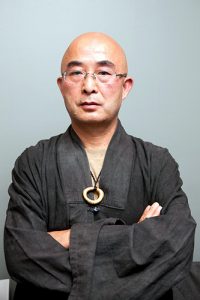ChinaFile Presents: The Future of Dissent Inside and Outside of China

Please join PEN America and ChinaFile for a discussion with internationally acclaimed Chinese author Liao Yiwu. A reporter, novelist, poet, and musician, Liao is best known for The Corpse Walker, his 2008 collection of interviews with laborers, migrants, and other people living at the margins of China’s economic boom, and for For a Song and a Hundred Songs, a memoir of the prison term he served for his writings about the Tiananmen protests. Since 2011, he has lived in exile in Berlin.
In conversation with the Council on Foreign Relations’ Ian Johnson, Liao will discuss the role of political dissent in exile, the use of fiction as a means for grappling with history, as well as his recent novels Wuhan, about the outbreak of COVID-19, and Love in the Times of Mao Zedong, set during the Cultural Revolution, and his documentary film on the construction of a Taiwanese memorial to Nobel Peace Prize-winning dissident Liu Xiaobo.
The conversation will be conducted in Chinese and English with translation, and is co-hosted by ChinaFile and PEN America.
Participants
 Liao Yiwu is a writer and musician who was born in Sichuan province, China. He was mostly apolitical until the 1989 Tiananmen Square protests. After June 4, he wrote a poem about the brutal crackdown, and was imprisoned for four years. After his release, he became interested in documenting the oral histories of people in unconventional spaces and on the margins of society, often taking liberties to reimagine these conversations. He documented stories from survivors of the 2008 Sichuan earthquake, signed the pro-democracy treatise Charter 08, and advocated for the release from detention of Nobel Peace Prize winner Liu Xiaobo and his wife Liu Xia.
Liao Yiwu is a writer and musician who was born in Sichuan province, China. He was mostly apolitical until the 1989 Tiananmen Square protests. After June 4, he wrote a poem about the brutal crackdown, and was imprisoned for four years. After his release, he became interested in documenting the oral histories of people in unconventional spaces and on the margins of society, often taking liberties to reimagine these conversations. He documented stories from survivors of the 2008 Sichuan earthquake, signed the pro-democracy treatise Charter 08, and advocated for the release from detention of Nobel Peace Prize winner Liu Xiaobo and his wife Liu Xia.
The Chinese government has banned Liao’s writing and denied him exit visas. In 2011, he fled China and has since lived in exile in Berlin. He has published multiple books, including The Corpse Walker, a series of interviews; For a Song and a Hundred Songs, about his experience in prison; Wuhan, a fictionalized narrative of the pandemic; and others. He produced the documentary film Liu Xiaobo in Formosa, about a memorial sculpture to Liu Xiaobo in Taiwan. His latest novel is Love in the Times of Mao Zedong, set during the Cultural Revolution.
 Ian Johnson is a Pulitzer Prize-winning writer, researcher, and Senior Fellow for China Studies at the Council on Foreign Relations. His new book, Sparks: China’s Underground Historians and their Battle for the Future, describes how some of China’s brightest minds are are challenging the Communist Party on its most important pillar of support: its control of history. Johnson has reported from China for The Baltimore Sun, The Wall Street Journal, The New York Times, The New York Review of Books, and other publications. He won the 2001 Pulitzer Prize for his coverage of China, two awards from the Overseas Press Club, an award from the Society of Professional Journalists, and Stanford University’s Shorenstein Journalism Award for his body of work covering Asia. In 2019, he won the American Academy of Religion’s “best in-depth newswriting” award.
Ian Johnson is a Pulitzer Prize-winning writer, researcher, and Senior Fellow for China Studies at the Council on Foreign Relations. His new book, Sparks: China’s Underground Historians and their Battle for the Future, describes how some of China’s brightest minds are are challenging the Communist Party on its most important pillar of support: its control of history. Johnson has reported from China for The Baltimore Sun, The Wall Street Journal, The New York Times, The New York Review of Books, and other publications. He won the 2001 Pulitzer Prize for his coverage of China, two awards from the Overseas Press Club, an award from the Society of Professional Journalists, and Stanford University’s Shorenstein Journalism Award for his body of work covering Asia. In 2019, he won the American Academy of Religion’s “best in-depth newswriting” award.






